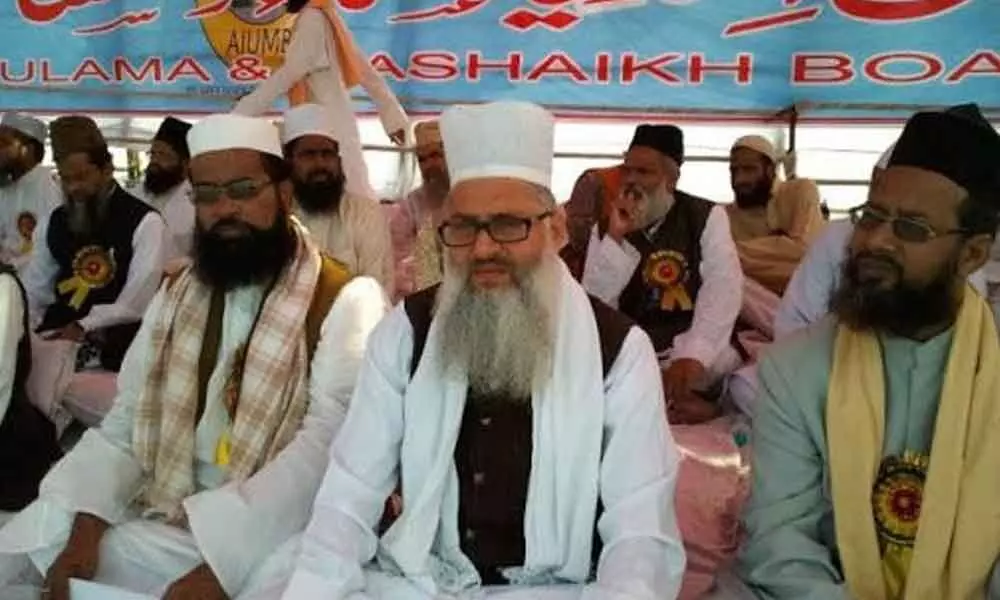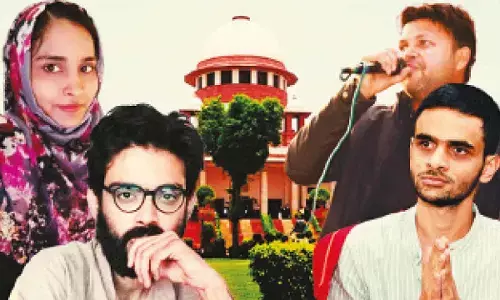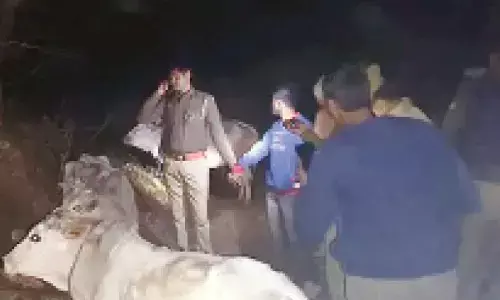Liberal cleric sounds like a contradiction but not Kalbe Sadiq

Liberal cleric sounds like a contradiction but not Kalbe Sadiq
Mir Taqi Mir describes his 'perfect' man in a rubayee: "Miliye us shaqs se ke jo aadam hovey, Naz apne kamal par use kum hovey, Boley to usey sunne ko aaye khilqat, Khamosh rahey to ek alam hovey."
Mir Taqi Mir describes his 'perfect' man in a rubayee: "Miliye us shaqs se ke jo aadam hovey, Naz apne kamal par use kum hovey, Boley to usey sunne ko aaye khilqat, Khamosh rahey to ek alam hovey." (The person to seek out must, above all, be humane, He must not wear his knowledge on his sleeves, When he speaks, the world listens to him, But when silent, he is a universe unto himself)
The quatrain applied aptly to Saiyyid Kalbe Sadiq, who passed away at 83 in Lucknow earlier this month.
Just as Lucknow has lost so much of the eclectic culture nursed over hundreds of years, the death of Maulana Kalbe Sadiq brings down the curtain on the institution of the 'Aalim', which derives from 'ilm' which means 'knowledge'.
That this was largely a Shia institution is easily explained: the Nawabs of Awadh were Shia, which is where the patronage came from. This must not detract from the fact that internationally known Sunni institutions like Darul Uloom Nadwatul Ulema, or the House of Knowledge also flourished.
There was considerable intellectual rapport between the sects. How else does one explain the masterly 'Muazna-e-Anis-o-Dabir', comparative study of Anis and Dabir, written by one of Nadwa's greatest scholars Shibli Nomani. Anis and Dabir were famous Marsia writers, a genre focused on the tragedy of Karbala, central to the observance of Moharram, not exclusively but primarily a Shia occasion.
Kalbe Sadiq came from a long line of 'Ulema' (plural for Aalim), or theological scholars conversant with liberal traditions of which Sufism was another important part. Saiyid Waris Shah, the Pir of Dewa Sharief, seven kilometers away from Lucknow, had a simple explanation for not going through the rituals of 'Namaz', prayer. "Where is the space to bow in supplication?" The implication was: "He is in me."
During my school days, a phase of cultural bifurcation between school and home, the two towering 'Alims' of Lucknow were Maulana Kalbe Hussain (alias Kabban Sahib), Kalbe Sadiq's father, and Maulana Ali Naqi (Naqqan Sahib), both brilliant orators whose sermons were much valued at congregations called the 'Majlis'. The themes ranged from history, politics, metaphysics, any subject, provided the speaker deftly brought in Karbala, preferably towards the end to clinch the argument.
Lucknow's celebrated tapestry of manners did find itself frayed even in this limited circle of theologians and their flock of followers. A group, clearly not from among 'Naqqan Sahib's' followers, created what for Lucknow was a major scandal. The group accused the respected cleric of blasphemy and physically assaulted him.
Apparently, Naqqan Sahib had in his researches spotted mention of water in Imam Hussain's tent. Even a hint on these lines was anathema to a bunch of fanatics. The absence of water in Karbala's torrid heat heightens Hussain's tragedy. For that very reason, even a suggestion of water in Karbala would soften the tragic effect. The truth, of course, is that 'Naqqan Sahib' had never said that 'water' was available. He had simply cited sources which hinted at such a possibility.
Worst was the treatment meted to poet Yaas Yagana Changezi, a contemporary of Jigar, Firaq and Josh. Yagana wrote:
"Samajh mein kuch nahee ata, Parhey jaaney se kya hasil? Namazon mein hain kuch maaney, to pardesi zabaan kyon ho?" (What's the point of reciting namaz, When you do not know its meaning?)
The simple question is: Why should namaz be in a foreign language?)
Put it down to Lucknow's open mindedness that this affront was tolerated. But in the next instance the pot boiled over.
In one of his 'naats' or religious songs, Yagana referred to Prophet Mohammad in less than reverent terms. He probably did not know that he had violated one of the unenforced codes:
"Ba Khuda deewana baash-o, Ba Mohammad hoshiyar." (Take liberties with God, but be careful with Mohammad)
Dara Shikoh's Prime Minister, Chandrabhan Brahman broke the code most brazenly: "Panja dar panja-e-Khuda daram, Man che parwa e Mustafa daram." (My hand is in the hand of God: Why should I worry about Mohammad?)
It reflects in the backward slide of a tolerant culture, that Yagana did not go scot-free. His face was blackened black and he was given a donkey-ride through the old city.
The liberal streak in the 'Ulema' of Lucknow comes out in bold relief in an incident concerning Josh Malihabadi. His Marsia titled Hussain and Revolution became a cult poem even in devout circles. Josh became a popular invitee to various Imambaras of Lucknow, indeed across the country. He built up a reputation for Marsia writing, second only to the great Mir Anis. A group of orthodox Shias turned up at the residence of the great Aalim of his age, Maulana Naasir ul Millat armed with a plaint. Josh, devoted to liquor (he called it Kaaba e khaas o aam) should be banned from reciting Marsias from pulpits in "our sacred Imambaras".
After reading Josh's Marsias, the Maulana invited the complainants and Josh. What happened next was dramatic. The Maulana spread out his personal prayer mat for Josh and invited him to recite 'Hussain and Inquilab'. The message from the Maulana was straightforward: it would be wrong to occupy the pulpit inebriated. Otherwise, there is no specific bar on drinking.
This was the open mindedness Maulana Kalbe Sadiq inherited from generations of 'Ulema'. From the 1990s he had pleaded: Even if the Muslims win the Ram Janmabhoomi land dispute, they should gift the land to the Hindus. "You will win their goodwill." His point was that a Muslim can turn towards Kaaba and say his prayers anywhere. "Ram is central to Hindu ethos." He initiated joint Shia-Sunni Namaz, allowing the Sunni cleric to take the lead.
He traced Muslim backwardness to a singular lack of education and dedicated his life to establishing nonsectarian institutions in every possible field. But he died a disappointed man because of expanding communalism and a community trapped in the snare of selfish political leaders.
(The writer is a senior commentator on political and diplomatic issues. The views expressed are personal)













